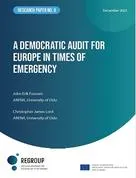A democratic audit for Europe in times of emergency

REGROUP Research Paper No. 8 (December 2023)
The purpose of this paper is to sketch the outline of a Democratic Audit of the pandemic with explicit focus on the European Union. We take as our point of departure that the corona pandemic was understood as a time of emergency, and this understanding was widely shared. Hence, in order to understand the democratic and constitutional implications of the pandemic we need to focus on the nature and conditions of politics in times of emergency. Emergencies can make it hard to deliver democratic politics to normal standards: to hold elections in normal ways; to pass laws by normal democratic procedures without legislatures ceding their powers to executive discretion if not decree; to gather representatives together in parliaments to scrutinise and debate responses to emergencies; to maintain full rights of free speech and assembly at the core of democratic politics. Yet crises, and even emergencies, are likely to be recurring features of our world of fragile, interdependent systems that displace problems with and between themselves. Democracies, therefore, need to define what standards and procedures should apply in an emergency. They will need to think counterfactually and not just historically: to anticipate possible emergencies and not just draw lessons from those experienced. Much recent literature has turned away from the idea of emergency powers as a state of exception outside the normal politics and procedures of the democratic constitutional state. Rather, it asks how the powers and politics of emergency can themselves be embedded in democratic institutions and constitutional procedures. The paper starts by clarifying what is meant by democratic audit. It thereafter proceeds to discuss how to adapt the democratic audit framework to the special conditions surrounding emergency politics, and thereafter outlines three different positions in the international literature on emergency governance that it holds up against the democratic audit framework. The next part provides an overview of emergency politics criteria as defined by the Council of Europe. These criteria have been devised for the assessment of constitutional democracies understood as states, and therefore need modification to apply to the complex multilevel EU setting. The paper does that by first highlighting some of the distinctive traits of the EU that need to be taken into consideration, and thereafter pulls these elements together to present the outline of a Democratic Audit of the pandemic for the multilevel EU. The final part concludes.